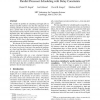Free Online Productivity Tools
i2Speak
i2Symbol
i2OCR
iTex2Img
iWeb2Print
iWeb2Shot
i2Type
iPdf2Split
iPdf2Merge
i2Bopomofo
i2Arabic
i2Style
i2Image
i2PDF
iLatex2Rtf
Sci2ools
134
click to vote
SODA
2001
ACM
2001
ACM
Parallel processor scheduling with delay constraints
We consider the problem of scheduling unit-length jobs on identical parallel machines such that the makespan of the resulting schedule is minimized. Precedence constraints impose a partial order on the jobs, and both communication and precedence delays impose relative timing constraints on dependent jobs. The combination of these two types of timing constraints naturally models the instruction scheduling problem that occurs during software compilation for stateof-the-art VLIW (Very Long Instruction Word) processors and multiprocessor parallel machines. We present the first known polynomial-time algorithm for the case where the precedence constraint graph is a forest of in-trees (or a forest of out-trees), the number of machines m is fixed, and the delays (which are a function of both the job pair and the machines on which they run) are bounded by a constant D. Our algorithm relies on a new structural theorem for scheduling jobs with arbitrary precedence constraints. Given an instance ...
Related Content
| Added | 31 Oct 2010 |
| Updated | 31 Oct 2010 |
| Type | Conference |
| Year | 2001 |
| Where | SODA |
| Authors | Daniel W. Engels, Jon Feldman, David R. Karger, Matthias Ruhl |
Comments (0)

